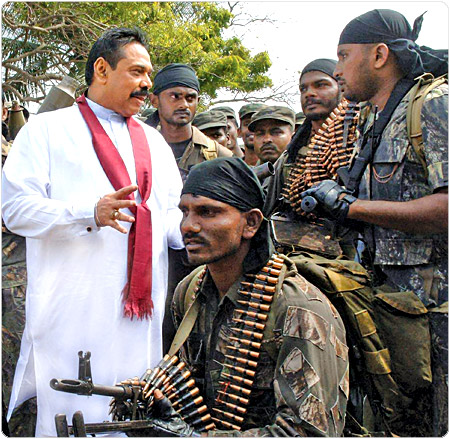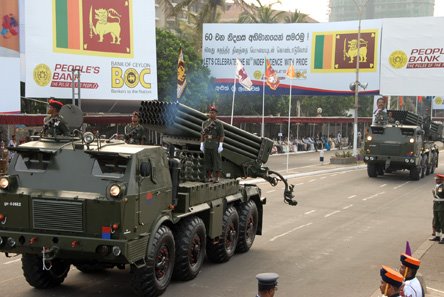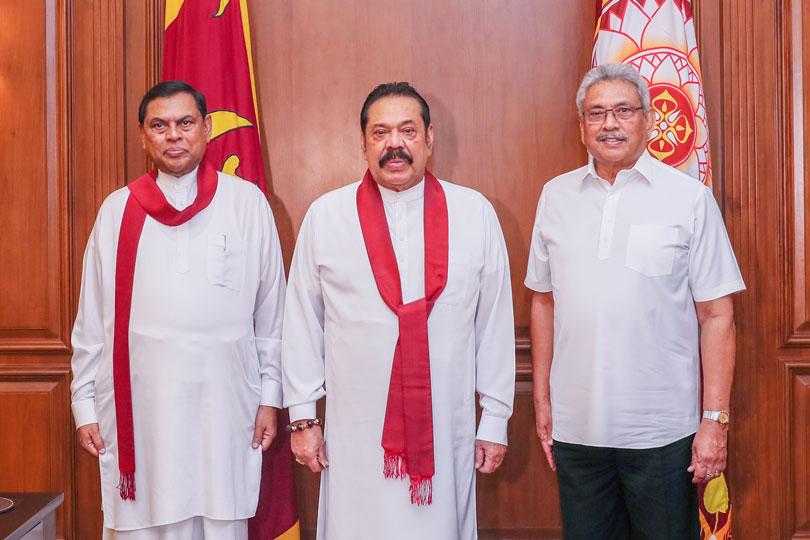Basil Rajapaksa (right) with his brothers Gotabaya (centre) and Mahinda (left).
Sri Lanka’s finance minister Basil Rajapaksa revealed how his government illegally purchased weapons from North Korea during the height of the armed conflict, using money sourced from the “black market”.
Rajapaksa, who holds US citizenship, told The Sunday Divayina this week that during the peak of Sri Lanka’s military offensive, he and other Sri Lankan officials would personally visit the ‘Pettah’ Business District in Colombo to speak with traders and obtain dollars in the black market.
The money would then be used to purchase arms from North Korea, he continued.
The revelation has sparked an outcry from around the world, following years of denials from Sri Lankan officials over any such purchases.
North Korea has been subjected to several United Nations-backed sanctions which ban the trade of several arms and military equipment. Not only is the Sri Lankan finance minister openly admitting that his government may have breached United Nations sanctions, but Rajapaksa himself is now potentially open to prosecution.
Not the first time
Sri Lanka has been accused of breaching sanctions on North Korea by purchasing weapons in the past.
In May 2009, when Sri Lanka’s military was heavily engaged in an offensive that saw hospitals bombed and tens of thousands of Tamils killed, a leaked US embassy cable said Sri Lanka was negotiating an arms deal with Pyongyang. Rajapaksa's elder brother Mahinda Rajapaksa was Sri Lanka's president at the time, whilst his other brother Gotabaya was defence secretary. Both have been accused of war crimes. Gotabaya has since become Sri Lanka's president, whilst Mahinda now sits as prime minister.

Mahinda Rajapaksa with Sri Lankan troops in 2009.
The cable cited intelligence reports as noting Sri Lanka was looking to purchase “RPG-7 Rocket Propelled Grenade Launchers (RPGs) and Multiple Rocket Launchers (MRLs) from North Korea's primary weapons trading firm”.
The army had used Czechoslovakian-built RM 70 MBRLs during its military offensive - a weapon capable of firing 40 rockets packed with 256 kg of explosives in just 30 seconds - to devastating effect during the armed conflict. In February 2008, at the height of the killings. Slovakia reportedly sent 10,000 rockets to Sri Lanka amidst criticism that the sale had broken European Union regulations. Unconfirmed sources speculated that Sri Lanka paid just $180 per rocket.
See more from the BBC on that sale here and from the Slovak Spectator here and here. Previous purchases were also made in prior years, such as in 2000. See more on the acquisition of those weapons from the BBC here.

A Sri Lankan military parade showcases MBRLs purchased from abroad and deployed to deadly effect.
“Some of these proposed arms imports appear to violate UNSCR 1718,” the cable continued.
It made clear that Sri Lanka had previously been accused of breaching other UN Security Council sanctions through seeking to purchase weapons from Iran, and Colombo had been “demarched” by the US government.
“As part of our ongoing dialogue on nonproliferation, we would like once again to express our concern over Sri Lanka's potential procurement of lethal military equipment from Iran and North Korea,” it continued.
“We also want to remind the GOSL of possible sanctions under the Iran, North Korea, and Syria Nonproliferation Act (INKSNA). The INKSNA requires regular reports to Congress identifying individuals and entities who have transferred to or acquired from Iran, North Korea, or Syria certain items related to weapons of mass destruction, ballistic or cruise missiles or advanced conventional weapons.”
At the time, Sri Lanka strenuously denied it had made any purchases.
Sri Lanka’s UN ambassador, Palitha Kahona, told Turtle Bay in 2011, "at the time, the government issued a denial, a total denial to these allegations”. “I think the position remains the same," he concluded.
A 2017 UN Panel of Experts report on North Korea however said that the “Democratic People’s Republic of Korea is flouting sanctions through trade in prohibited goods, with evasion techniques that are increasing in scale, scope and sophistication”.
It went on to detail how two North Korean diplomats “travelled together to Sri Lanka three times (between 2014 and 2016) to discuss shipbuilding projects”.
“Described as boat-building experts, they reportedly met with the State Minister of Defence of Sri Lanka on 5 November 2015 to discuss building naval patrol vessels at a Sri Lankan shipyard prior to sale to its navy,” the report continued.
Though the UN experts wrote to the Sri Lankan government, it noted that at the time of publication “the Panel has yet to receive a reply from Sri Lanka”.
Rajapaksa opens himself up for prosecution

The Rajapaksa siblings.
Rajapaksa’s latest remarks are the first time that a senior government official has confirmed the reports of purchases from Pyongyang. One of the starkest aspects of Rajapaksa’s interview though, was how the finance minister had now opened himself up for prosecution from US authorities.
Just last year, a US-citizen pled guilty in court to helping North Korea evade US sanctions through the use of cryptocurrency. He is to be sentenced later this month and faces a lengthy jail term. In 2020, the US government also charged 28 North Korean and five Chinese individuals with facilitating more than US$2.5 billion in illegal payments for North Korea’s nuclear weapons program.
The US has already placed travel bans on several Sri Lankan soldiers over war crimes, but dual-citizen Rajapaksa may have made himself liable to prosecution.
And whilst the minister did not elaborate on which weapons were purchased or when, his remarks have led to questions over the legality of such trades and how any arms would have been used.
“This is the tip of the iceberg,” said Jan Jananayagam, director of Together Against Genocide (TAG).
“We have long believed that Sri Lanka’s genocide of Tamils was accomplished using, among others, weapons purchased from sanctioned parties including North Korea and Iran. Some of these unlawfully acquired weapons, such as cluster munitions and chemical weapons were unspeakably brutal toward the Tamil civilian population who were their targets.”
In recent years, states around the world have come under pressure over military assistance and the supply of weaponry to Sri Lanka, given the island’s chequered human rights record.
“Never forget that an estimated one in five of the civilians in the so-called ‘No Fire Zones’ (where these weapons were used) were children at or under the age of twelve,” added Jananayagam.
Sri Lanka has refused to hold anyone to account for crimes committed during the time and consistently pushed back against efforts for an international investigative and accountability mechanism. Rajapaksa’s latest remarks however shed more light on the international support that Sri Lanka sought at the time, possibly breaking UN sanctions whilst doing so.
“I look forward to justice for these and other mass atrocity crimes,” Jananayagam concluded.
